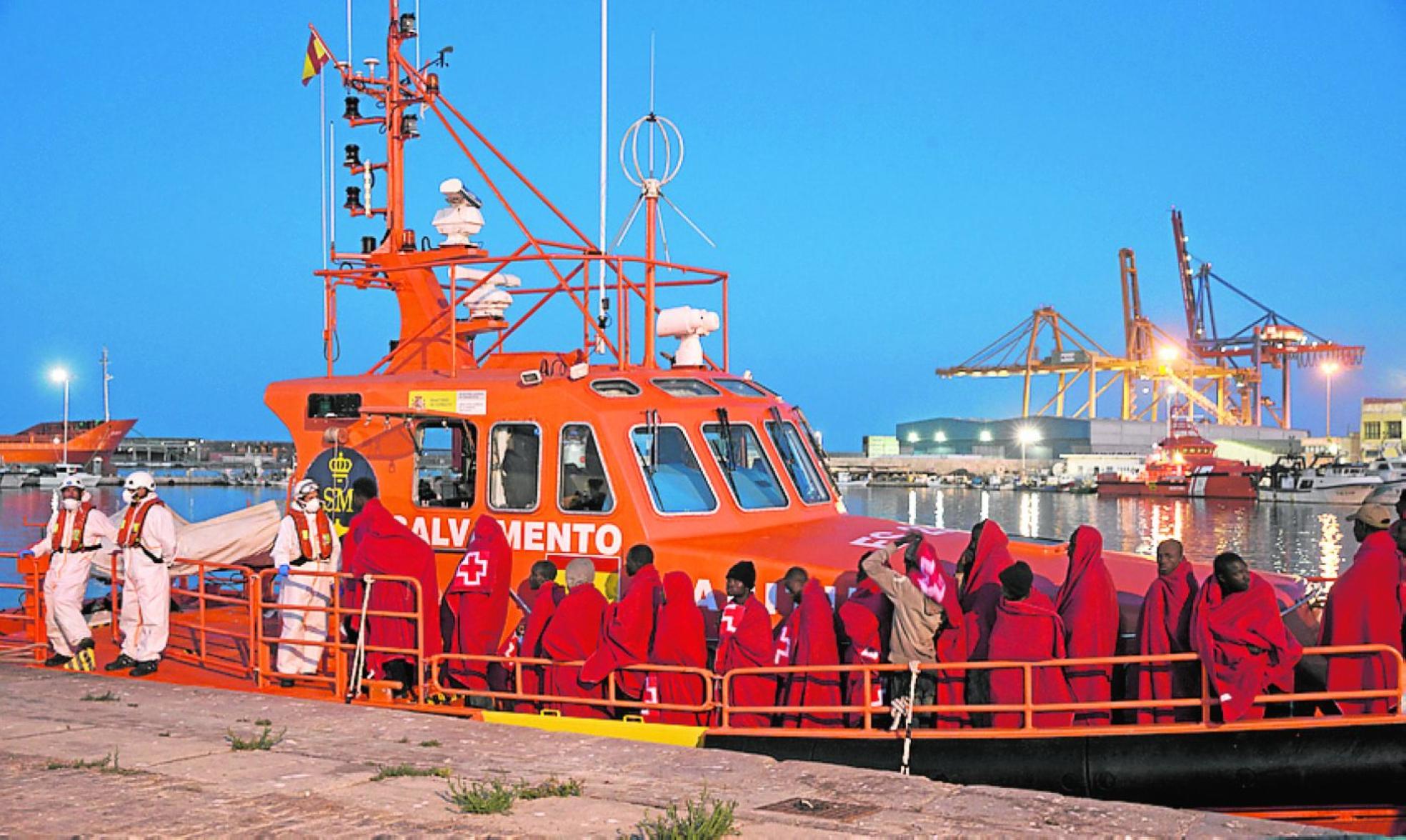
An orange ship that keeps hope alive
Rescues. ·
The crews of the Salvamar Alnitak assist with any emergency that happens at sea and not even the worst conditions stop them trying to save livesSections
Highlight

Rescues. ·
The crews of the Salvamar Alnitak assist with any emergency that happens at sea and not even the worst conditions stop them trying to save livesIRENE QUIRANTE
Friday, 20 May 2022, 11:57
They are in a state of constant alert. The calls can come at any time. A small boat with pregnant women and children on board is about to sink; a ship has run out of fuel and has been drifting for hours; a boat is letting in water...orange has become the colour of hope for those in difficulties in the vast expanses of the sea.
The crew of the Salvamar Alnitak maritime rescue ship are more than accustomed to acting in "extreme situations" and being guardians of the ocean. For them, this is not just another job. It is a profession, and a way of life. They are also used to the fact that the weather never makes it easy for them when emergencies occur in Malaga's waters.
Although the members of the two crews can be counted on the fingers of one hand - a captain, two sailors and an engineer - they are able to rise above even the worst storm when it comes to saving lives.
The pandemic, among other consequences, has led to a decrease in the number of people who set off in small boats to try and reach the shores of Andalucía in search of a better life. Even so, last year the Salvamar Alnitak helped around 100 people to reach dry land, as well as attending calls to assist another 450.
"The maritime activity off Malaga is still very intense and everything points to the fact that it will increase; if it isn't for one reason, then it's for another, but here it never stops," says Alejandro Rodríguez, the captain of one of the Salvamar crews. Before the migratory flows were altered by the eruption of the coronavirus, there were years when rescues were continual. In 2017 alone they saved more than 1,500 people from a tragic end in the waters off Malaga.
Day to day life on the orange ship is marked by never knowing what might happen and, above all, having to act fast when something does. Whenever there is a call from the Coordination Centre in Tarifa, and they are given the coordinates, the guardians of the sea mobilise without losing time. "You drop whatever you are doing, so you can be sailing within 15 minutes at the most," says the captain.
The time it takes to get there, however, always depends on the conditions at sea. The crew know what it is like to try to sail against the current, with waves up to nine metres high and in complete darkness. They are familiar with the knot they get in the stomach every time they find themselves in the perfect storm and the sea makes it impossible to advance.
In the cabin, the crew have company: a picture of the patron saint of sailors, the Virgen del Carmen. Rodríguez jokes that even though he has no religious faith, there are nights when the crew have no alternative but to ask her for help. Especially when they know that people's lives are in danger and the sea is not disposed to help them get there to save them.
"It is very physical work, but it is also demanding mentally," says Rodríguez. Apart from the inclemencies of the weather, they have to face risks when a rescue is complicated and needs four people to get involved. In the case of Rodríguez, who spent 19 years as a crew member before becoming captain, he has several war wounds from his time as a sailor, although his shoulder bore the worst of many injuries he suffered on board. And despite that, he wouldn't change his job for anything. If there is something that the crew of the Salvamar Alnitak have in common, it is an uncompromising vocation for helping people at risk. "What you feel when you go to assist someone and everything goes well is just incredible happiness and satisfaction," says the captain.
Although there is another side to it. The most dramatic, and one to which there are very few witnesses. It's a reality that the crew of this ship know well. They are aware that the ocean is becoming a mass grave of enormous dimensions, above all for those who try to migrate and reach Europe this way because of the lack of other, legal and safe, alternatives.
"With time you learn not to take the pain home with you because we have seen everything," says Rodríguez. The feeling of helplessness is unbearable when cases end in tragedy. "You can't help thinking that you should have done more, although we do absolutely everything that we possibly can," he says.
As well as assisting people at sea, the Maritime Rescue fleet also monitors compliance with environmental protection measures. If a ship discharges waste into the sea, the crew will take samples so they can be analysed and reports the matter to the Guardia Civil. "Fortunately, people are becoming more aware so there are few cases of contamination of the sea now," Rodríguez explains.
For these people, the sea has to be synonymous with life. And those on the Salvamar Alnitak will stay on constant alert to try to ensure that it remains so.
¿Ya eres suscriptor/a? Inicia sesión
Publicidad
Noticia Patrocinada
Publicidad
Nuria Triguero | Málaga
Esta funcionalidad es exclusiva para suscriptores.
Reporta un error en esta noticia
Comentar es una ventaja exclusiva para registrados
¿Ya eres registrado?
Inicia sesiónNecesitas ser suscriptor para poder votar.